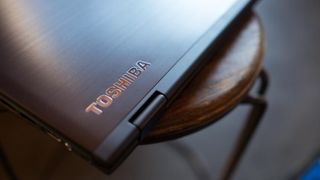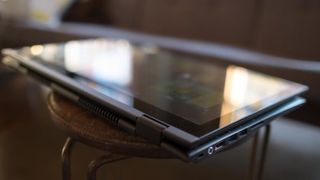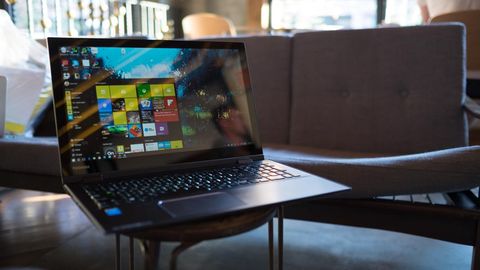Why you can trust TechRadar
The Toshiba Satellite Radius 15 weighs 4.96 pounds (2.24kg), just heavy as much as any other modern 15-inch laptop. Similarly, the Asus ZenBook Pro UX501 tips the scales at 5 pounds (2.26kg) flat, while the Dell Inspiron 15 7000 slips in as the lightest machine at slightly 4.7 pounds (2.13kg).
Thanks to dropping the optical drive for a thinner frame, the Radius 15 only measures 0.79 inches (20mm) thick. On top of the slimmer frame, it also has a smaller 14.9 x 9.6-inch (378 x 244mm) footprint than other 15-inch rigs. By comparison, Asus and Dell's laptops measure 15.08 x 10.04 x 0.84 inches (383 x 252 x 19.9mm) and 15.04 x 9.94 x 0.78 inches (382 x 252 x 19.8mm), respectively.

Here is the Toshiba Satellite Radius 15 configuration sent to techradar for review:
Spec sheet
- CPU: 2.4GHz Intel Core i7-5500U (dual-core, 4MB cache up to 3GHz with Turbo Boost)
- Graphics: Intel HD Graphics 5500
- RAM: 12GB DDR3L (1600MHz)
- Screen: 15.6-inch, 4K Ultra HD (3,840 x 2,160) TruBrite, LED backlit, IPS touchscreen
- Storage: 512GB mSATA SSD
- Ports: 2 x USB 3.0 ports (one with Sleep and Charge), 1 x USB 2.0, 1 x HDMI, SD card reader, headphone/mic combo jack
- Connectivity: Intel Dual-Band Wireless-AC 7265, Bluetooth 4.0
- Camera: 720p HD webcam
- Weight: 4.96 pounds
- Size: 14.9 x 9.6 x 0.79 inches (W x D x H)
Configuring the Satellite Radius 15 to the spec listed above on Toshiba's website rings up a grand total of $1,599. (Toshiba, however, has since swapped out the 5500U processor for a new Skylake 6500U chip.) That's not a bad price for what is essentially a souped-up 15-inch MacBook Pro with an even sharper display, but lacking the dedicated graphics.
It's also worth noting that this notebook starts at $799 with a more standard 1,366 x 768 display and an Intel Core i3-5015U processor with a 750GB hard drive and 4GB of RAM.
The best available spec for the Radius 15 in the UK comes priced at £699 and includes a 1080p touchscreen, 1TB hybrid storage drive, 8GB of RAM and an Intel Core i5-6200U processor. As for Australia, the Satellite Radius series isn't even available at 15 inches. The closest thing those in the AU can get is a Satellite Radius 14, which can be configured comparably with an Intel Core i7-5500U processor for AU$1,799.

The Asus ZenBook Pro UX501 comes pretty well equipped itself. For a flat $1,499 or £1,679 (about AU$2,062), this 15-inch notebook comes stock with a 4K display that's just as sharp. However, the color gamut it produces is ever so slightly duller.
Asus's own 4K laptop also has a slightly older, 2.6GHz Intel Core i7-4720HQ processor, but the UX501 makes up for this deficit with an Nvidia GTX 960M graphics chip, more RAM and one of the industry's fastest PCI-Express connected SSDs that also offers 512GB of storage.
The Dell Inspiron 15 7000 special edition is an exceptionally well-put together machine for its $999 or AU$1,499 price tag. Of course, being the most affordable alternative has it pitfalls. This laptop is limited to a Full HD, 1,080p resolution plus a 500GB hard drive. The only upside is it comes outfitted with an Intel Core i5-6200U chip right off the Skylake block.
Going by specs, the ZenBook Pro and Radius 15 are almost neck in neck with some slight variances. Where Toshiba has the leg up in memory and newer processor, Asus offers discrete graphics and PCI-express connected storage for faster data transmission rates. The 15-inch Dell Insprion is the most affordable option of this bunch, but it's the least well equipped.
Kevin Lee was a former computing reporter at TechRadar. Kevin is now the SEO Updates Editor at IGN based in New York. He handles all of the best of tech buying guides while also dipping his hand in the entertainment and games evergreen content. Kevin has over eight years of experience in the tech and games publications with previous bylines at Polygon, PC World, and more. Outside of work, Kevin is major movie buff of cult and bad films. He also regularly plays flight & space sim and racing games. IRL he's a fan of archery, axe throwing, and board games.


